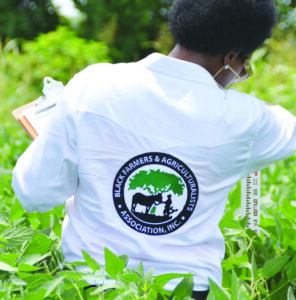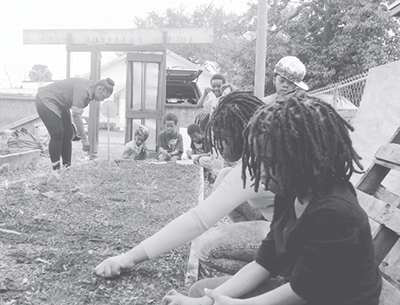By BEVERLY JAMES
(Source: Florida Courier)

The Florida chapter of the national Black Farmers and Agriculturalists Association’s goal is to educate and train Black Florida ranchers and farmers on the latest techniques of farming for economic improvement and self-independence for economic improvement and self-independence, while promoting and marketing their products and providing cultural fellowship.
 Courtney Wilson looks out on his 25-acre farm in Ocala and the additional 125 acres that he leases for grass-fed cattle. He shakes his head and glances at the sun, his optimism refusing to wane.
Courtney Wilson looks out on his 25-acre farm in Ocala and the additional 125 acres that he leases for grass-fed cattle. He shakes his head and glances at the sun, his optimism refusing to wane.
“We’ve been through bad times before, so we’ll survive,” Wilson said. “The Great Depression, the recession, none of it could keep us down.”
President Donald Trump’s administration’s tariffs on imported products have resulted in retaliatory answers from countries that usually buy American goods. Now, Black farmers and ranchers are feeling the brunt of tariffs and an economy in free fall.
For example, in response to higher taxes on products coming in from China, that government has added a 34% tariff on soybeans sold by the United States to China. As a result, U.S. soybeans are prohibitively expensive. Instead of buying soybeans from the U.S., China has now turned to Brazil, leaving American farmers reeling.
For smaller farmers and ranchers like Wilson, president of the Flori- da chapter of the Black Farmers and Agriculturists Association, it means watching family-owned farms disappear. “We have fewer farmers than in the ‘60s. A lot of people losing farmland and developers are buying up the land cheap to develop for new housing,” he said. “Tariffs are affecting every farmer, and the increase in cost for parts from overseas is killing us.”
Black farms dwindle
In 2022, there were 46,738 Black producers involved in decision making for 32,653 U.S. farms, according to the U.S. Census of Agriculture. This is compared to 3,399,834 producers overall on 1,900,487 farms. The number of Black producers decreased 4% from 2017.
Florida ranks seventh of the top 12 states with Black producers and farms.
The number of Black-operated farms dropped from 8% between 2017 and 2022. Nevertheless, Black producers operated 5,323,654 acres, up 14% from 2017.
But that number has begun to decline again, with Black farmers selling off their land as they watch produce rot in the ground.
“Crops are dying in the fields with no buyers as the administration continues adding tariffs to other countries. These countries then retaliate by adding outrageous tariffs to our products or by flat out refusing to buy from us,” Wilson explained.
Smaller farmers may not feel the crush of tariffs like commercial operations, but the supply chain for equipment to run farms has become increasingly expensive, Wilson said. “Everything is about equipment and fertilizer. Most equipment and fertilizer are bought overseas, so every farmer has seen that price increase,” he added.
Farmers losing land
Another factor is the cost to lease land. According to Wilson, 50 acres is $50,000 before a farmer can even begin to plant crops.
“In Central Florida, the land is being sold and developed,” he said.
Wilson tells of visiting one farm in Caryville, a small town in the Florida Panhandle, and seeing a sad sight.
“Everybody was gone, all the workers, and the parents were out milking the cows. I don’t think they will survive,” he said.
According to the Center for Public Integrity, a study by the U.S. Department of Agriculture (USDA) found that Black farmers lost $326 billion in land — and wealth — between 1920 and 1997 alone. Today’s Black-owned farms are smaller and earn less than farms owned by white operators.
Black farmers are severely restricted by having less access to credit, the lifeblood of agriculture that allows farmers to success- fully operate a farm from one season to the next. The USDA, a lender of last resort, can help farmers who have nowhere else to go.
But for decades, the department denied Black farmers credit and access to benefit programs. And it still struggles to remedy the impact of that history of discrimination. A Center for Public Integrity analysis of data from the USDA found that the agency’s Black borrowers have the highest loan delinquency rates of all racial and ethnic groups.
Also, developers are swooping in to buy foreclosed land for pennies on the dollar. Vice President JD Vance is a silent partner in AcreTrader, a “farmland real estate investment company offering low mini- mum, passive farm investments.” It allows people, including foreigners, to purchase shares in real estate investment trusts as a form of passive income akin to a stock.
“Big farmers and investment groups are buying up land for 25 cents on the dollar,” Wilson said. “They’re driving farmers out, especially small operations.”
Some solutions
As Black farmers in Florida struggle, they turn to the state association, which has teamed up with Florida A&M University to lease 3,800 acres of land worked by 10 farmers. The research facility helps the Black farmers use best practices to grow crops.
Also, the University of Florida Institute for Food and Agricultural Sciences has a memorandum of understanding with the Black farmers’ organization to share cutting-edge research and facilities.
“We are grateful to the land-grant institutions for helping Black farmers across Florida,” Wilson added. “Because in these hard times, we need all the help we can get, and they are definitely stepping up.”

